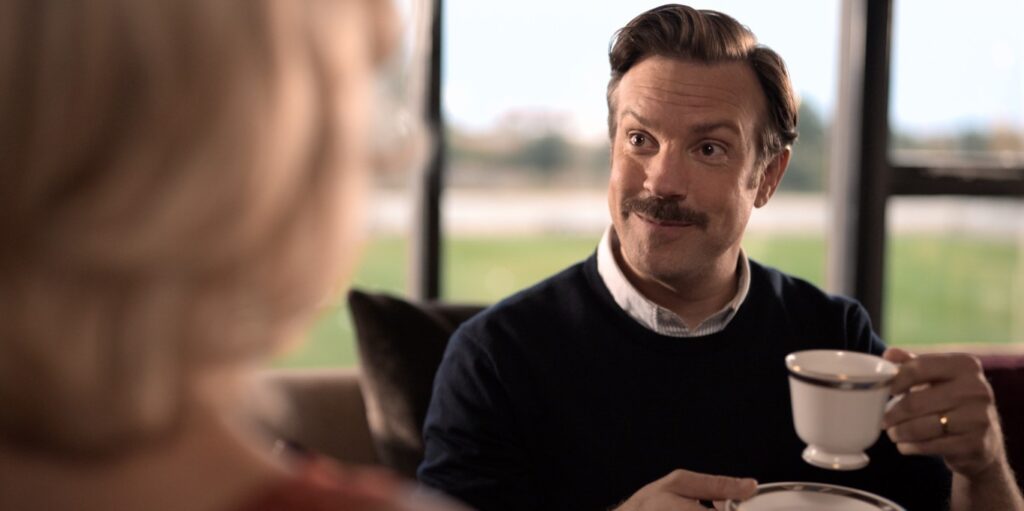Read also:
How to Watch FX Live Without CableHow To Watch AMC Without CableHow to Watch ABC Without CableHow to Watch Paramount Network Without CableJason Sudeikis adapts his NBC Sports commercial character to a slow-burn comedy that eventually finds its groove.
There’s been considerable ink spilled over the past few years about the central decency and kindness of the worlds created in Michael Schur shows like The Good Place and Parks and Recreation. Before Schur, there was Bill Lawrence. A fellow born and raised Nutmegger, Lawrence’s characters in shows like Spin City, Scrubs, and Cougar Town tended to be a little pricklier, a little less kind right off the blocks. However, over time all but the absolute worst revealed themselves to have some fundamental goodness.
Now Lawrence is back on Ted Lasso, the first show he has produced, written, and directed since 2016’s quickly cancelled Rush Hour television adaptation. Working with fellow producer and series star Jason Sudeikis, Ted Lasso is an attempt to take an NBC Sports commercial character and turn him into a single-camera sitcom protagonist. It is, shall we say, not the kind of thing that usually endeavors optimism.
This is ironic because Ted (Sudeikis) is nearly optimism incarnate. That’s why, along with his assistant coach, Coach Beard (Brendan Hunt, also credited as the show’s third creator), Lasso has hopped a plane to London to become the coach of a very mediocre soccer (football, to you non-Yanks) club. He is not dissuaded by the fact that his only success is with the fictional Division II Wichita State football (the American sort) team. (To be clear, Wichita State is real, that they have a football team is fiction.) Nor is he dissuaded by his near-total lack of practical knowledge about the sport or local customs.

Even under the best of circumstances, it would seem an unlikely path to success. But wait, as they say, there’s more. Rebecca (Hannah Waddingham), the team’s owner, is so angry with her ex that she is hoping to destroy the team as it is the only thing he truly cares about. Higgins (Jeremy Swift), head of football operations, is aware of her plan but too scared of her and too guilt-stricken about his role in her ex’s philandering to stop her.
The team’s best players are Roy Kent (Brett Goldstein) — an aging former superstar with lots of rage and little speed — and Jamie Tartt (Phil Dunster) — a rising phenom with little empathy but lots of talent. Finally, given Rebecca’s desire to tank the team, the only person with football experience who is on-hand to help Lasso is the oft-abused, ignored, and terrified “kit man” Nathan (Nick Mohammed, really killing it on the streaming service work this summer). And then there’s the dissolving marriage Ted is running away from back home.
Sudeikis’s performance as Lasso takes a little while to settle into, for both the actor and the viewer. At first, Sudeikis’s accent seems so broad it suggests Ted is intended as little more than a figure of mockery. Making matters worse is how just unreal Ted feels. At a time in America when the dividing lines between race and culture seem especially difficult to ignore, that Lasso comes across as so actively egalitarian and progressive feels strange. Additionally, anyone who knows anything about most college coaches, especially football coaches, will find his attitude towards the players and winning and losing absolutely antithetical to the norm.
[Juno] Temple might be the best surprise of the show, being both funnier and warmer than basically anything else I’ve seen her in before.
Still, as the show progresses, it finds a groove. Sudeikis’s performance becomes smoother and subtler. As viewers, we begin to understand that Lasso’s seeming idealization is an intentional choice on both his and the show’s part. Some might still dislike that choice, but it’s clearly a conscious move, not the result of poor writing. He’s intended to be someone who fulfills both the promise of America as a land of equality and a coach as a supportive and thoughtful mentor.
The show improves alongside Sudeikis as well. Relationships build, characters find nuance. Rebecca, seemingly set up as the show’s cruel villain, quickly becomes three-dimensional. This creates a stronger dilemma at the show’s core. Waddingham does well in presenting her as someone who is so sad and angry she can’t see how far away from herself she’s drifted. Her developing friendship with model/Jamie’s girlfriend Keeley Jones (Juno Temple) helps tremendously in this regard as well. Plus, it gives the very winning Temple a much bigger role in the series. Temple might be the best surprise of the show, being both funnier and warmer than basically anything else I’ve seen her in before.

Like the best of Lawrence’s works, the cast is strong and deep. Hunt’s Beard is subtly weird — and evidence that Lawrence, like Schur, has a love of silly character names. Goldstein grows to be a third lead and is probably the most recognizably Lawrence-style character on the show. Think a slightly more self-aware Dr. Cox from Scrubs. Lasso also boasts some very good guest turns from the likes of Anthony Head and Andrea Anders. It is the sort of show that tempts you to just keep writing things like, “And you know who else is really good? Toheeb Jimoh as Sam,” endlessly.
The only problem is that you might not know it in the first couple of episodes. When the show hits Apple+ this Friday, it does so with the first three episodes. While there are some things to recommend the series in that set, episodes four and five are probably the best of the season and far better indicators of the show’s overall quality. If you feel a sparkle of interest in the show, it is worth at least trying the fourth episode before making your final choice.
Ted Lasso is currently streaming on Apple TV+